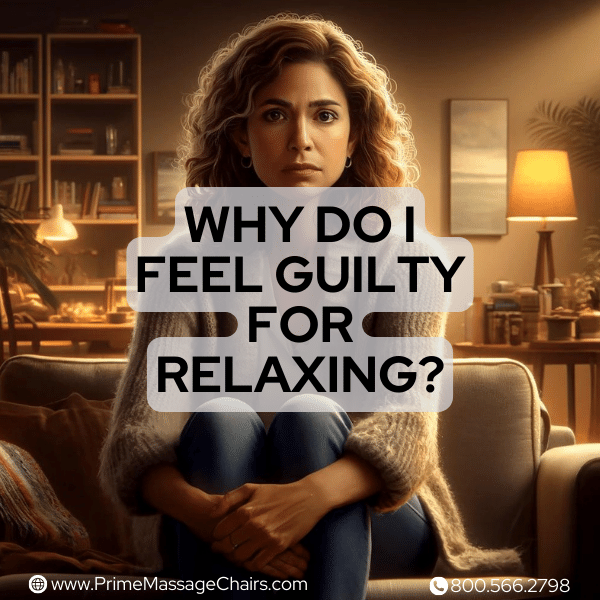
Why Do I Feel Guilty For Relaxing?
Have you ever tried to take a break and felt bad about it? You're not alone. Many people feel guilty for relaxing, even though it's important for our health.
This article will show you how to relax without feeling guilty.
Keep reading for some great tips!
Understanding the Guilt from Relaxation
Feeling guilty for taking it easy often comes from how we see ourselves. Our work and what we do can make us think we always need to be busy.

Link between identity and productivity
Many people link who they are to how much they get done. They feel that hard work proves their worth.
Holding this belief can make relaxation appear unproductive, though in reality, rest is essential for maintaining long-term productivity and well-being.
If you think success only comes from constant work, taking breaks feels like failing.
Society often praises staying busy over everything else. This idea pushes us to always want to do more and be more productive.
When we try to relax, guilt creeps in because we're not ticking tasks off our list or chasing the American dream of success through hustle.
Relaxing then becomes a battle with feelings of being unproductive instead of a chance to recharge and refresh our body and mind.
Influence of cultural perspective on work ethic
Cultural perspectives significantly influence perceptions of hard work. Some societies stress the importance of always being busy, potentially leading to guilt when resting.
This message makes us feel guilty for taking breaks. We grow up thinking we need to earn our rest.
The flexibility of remote jobs can sometimes blur the boundaries between work and leisure, which might increase feelings of guilt when relaxing.
We need to find balance in this new way of living and working.
The Physical and Mental Benefits of Rest
Adequate rest has been shown to reduce anxiety and can contribute to improved self-esteem by promoting better mental health.
These two big benefits help just about everyone, not just people who find it hard to stop working or scrolling through TikTok on their sofa.

Taking time to rest isn't wasting time. It's actually making sure you stay healthy and happy. Your brain gets a chance to pause and recover when you take a break, leading to more calm feelings and clear thinking.
Many seek more rest, recognizing its benefits in rejuvenating their energy and enhancing their sense of well-being.
A weekend away or a 10-minute break during work are simple ways to give your mind the quiet it craves.
This stillness helps fight off burnout from always trying to do something productive.
Rest becomes an essential part of keeping your work-life balance positive, making sure you can handle stress better and enjoy life’s small moments without feeling guilty for taking time out.
Identifying and Addressing Relaxation Remorse
Knowing the benefits of rest can sometimes clash with feelings of guilt. This struggle is what we call relaxation remorse. It's key to find out why you feel guilty when trying to relax.

Often, it's linked to feeling like you always need to be busy or fearing time spent relaxing is time wasted. Recognizing these thoughts is the first step in tackling them.
Setting boundaries for work and downtime can help separate these parts of your life. Choosing activities that truly refresh you makes relaxation feel more valid and productive.
Think about taking a leisurely walk or reading a book as giving your mind the break it desperately needs rather than time lost from work.
Acknowledging the power of rest, both physically and mentally, shifts how you view downtime from being lazy to crucial for well-being.
Practical Ways to Reduce Guilt When Relaxing
Discovering easy methods to feel less guilty during downtime can make a big difference.

Start by accepting that it's okay to take breaks. Mark relaxation moments on your calendar like they're important appointments.
Practice being in the moment with activities such as deep breathing or taking gentle walks, and view this quiet time as essential for your recharge.
Use these strategies to enjoy rest without regret and encourage you to learn more about embracing peace of mind guilt-free.
Acknowledging the need for relaxation
Everyone needs time to relax. It helps our bodies and minds recover from the stress of daily tasks and workloads.
You may often feel you always need to be doing something productive. But taking breaks is key for your overall health and well-being.
Start scheduling relaxation time just like any other important activity in your life.
Think of it as essential recovery time, not lost productivity.
By planning moments to unwind, you give yourself permission to take a break without feeling guilty about it.
Use this time for activities that make you feel more calm, like reading, taking a warm bath, or sitting outside around a fire.
Scheduling relaxation time
Set aside specific times for breaks in your calendar as you would with meetings or work tasks. This makes relaxation a part of your routine.
Treat these breaks as important appointments with yourself that cannot be missed.
By planning ahead, you ensure there's always time in your day to unwind.
Next, focus on mindful relaxation and think of it as 'recovery time'.
This approach helps shift how you see relaxation from being unproductive to essential for well-being.
Mindful relaxation and reframing it as 'recovery time'
Think of mindful relaxation as "recovery time." This idea helps you stop feeling guilty for taking a break.
Your body and mind need this downtime to get strong again, just like athletes rest after a big game.
Practice mindfulness or meditation to calm your thoughts. These tools teach you it's okay to take moments for yourself.
Calling rest "recovery time" changes how you see relaxing. It shows you’re not being lazy; you're getting ready to tackle what comes next with more energy.
Schedule short breaks throughout your day for these activities.
You deserve these pauses, and they make you better at handling your tasks and challenges.
The Power of Mindset Reframing in Overcoming Guilt
Changing how you think can make a big difference in dealing with guilt about taking breaks. Think of resting as necessary for your health, not as time wasted.
This shift helps you see relaxation as an investment in yourself.
You work better and feel happier when your mind and body have had enough rest.
Mindfulness meditation is a good tool to help change your mindset. It teaches you to stay present and enjoy the moment without feeling bad about what needs to be done or what you’re not doing.
With practice, this technique makes it easier for you to accept relaxation without guilt, leading to a calmer and more fulfilled life.
FAQs
Why do I start to feel guilty when trying to relax?
You might feel guilty because you think you should always be doing something productive, like tackling your to-do list or working hard. This feeling is common and shows you're not alone.
How can I stop feeling guilty for relaxing?
To stop feeling guilty, reframe how you see relaxation. Understand that giving your brain a break helps you feel accomplished later on. Remember, it's natural and okay to take time for yourself.
Is it normal to struggle with relaxation due to guilt?
Yes, many people find it hard to relax without feeling guilty, especially if they're used to staying busy all the time. It's something many work through with self-compassion and understanding.
Can taking a break actually help me get more done?
Potentially, yes. Taking breaks can lead to feelings of respite which may help increase productivity when you return to work tasks since your mind has had time to rest.
What are some activities designed to help me embrace relaxation without guilt?
Different activities like enjoying a hot bath, reading a book, or simply sitting quietly can help ease guilt and embrace relaxation as part of wellbeing.
Should I talk to someone if my guilt over relaxing doesn't go away?
If negative thoughts about downtime persist, talking with a licensed therapist may offer new perspectives and strategies for managing feelings of guilt about taking a break from busyness.
Conclusion
You deserve breaks and should not feel bad about taking them. Learning to view resting as necessary for your wellbeing can change how you feel.
Scheduling time off and seeing it as recovery helps a lot.
Practices like staying in the moment and limiting social media can also make relaxing easier.
So, go ahead, give yourself permission to unwind without guilt and enjoy the beautiful day you've been blessed with.
Disclaimer:
We do not provide medical advice. The content of this article, including text, graphics, and other material, is for informational purposes only. It is not intended to be a substitute for professional medical advice, diagnosis, or treatment. Always seek the advice of your physician or other qualified health provider with any questions you may have regarding a health condition. Never disregard professional medical advice or delay in seeking it because of something you have read in this article or on our website.
